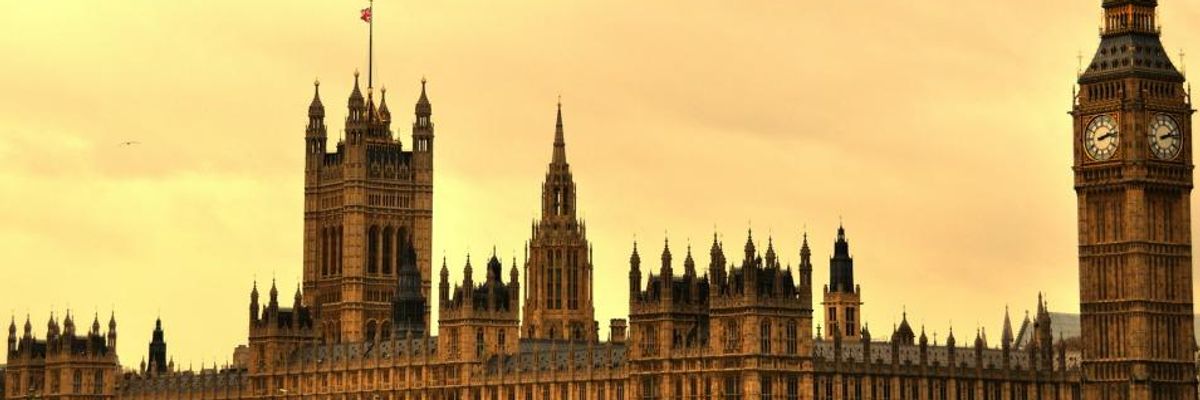As the controversial "emergency surveillance" bill being considered in the UK passed the House of Commons on Wednesday morning, privacy watchdogs criticized the law they say would allow the UK government to run an intrusive spying program on its citizens.
The Data Retention and Investigatory Powers (DRIP) bill passed 449 to 33 and is scheduled for a two-day final review by the House of Lords this week. Commons voted following a contentious but inexplicably brief debate between MPs that included accusations of back-door deals, according to The Guardian.
Despite its quick approval, the bill has been slammed by technology law experts, who warn that it would give the government too much power to spy on UK citizens and that legislators have not been given enough time for a thorough debate.
As Common Dreams reported earlier, DRIP would require communications companies to store and track the public's phone calls, text messages, and internet use and hand over the data to the government, even without a warrant. Proponents have said that there are enough safeguards in place to prevent the law from becoming the kind of intrusive surveillance program that was struck down by the European Court of Justice in April for violating the "fundamental rights to respect for privacy."
In an open letter to the members of Parliament, 15 internet policy scholars from the UK said the bill "goes far beyond" its intended use and that it "attempts to extend the territorial reach of the British interception powers, expanding the UK's ability to mandate the interception of communications content across the globe."
Prime Minister David Cameron defended the bill's quick progress through Parliament last week as an emergency measure against potential terrorism threats, stating in a press conference that he was "simply not prepared... to address the people after a terrorist incident and explain that I could have done more to prevent it."
The proposed bill "attempts to extend the territorial reach of the British interception powers, expanding the UK's ability to mandate the interception of communications content across the globe," Internet policy scholars write. "Sometimes in the dangerous world in which we live, we need our security services to listen to someone's phone and read their emails to identify and disrupt a terrorist plot," Cameron said.
But the bill "introduces powers that are not only completely novel in the United Kingdom, they are some of the first of their kind globally," the scholars' letter argues. "Further, the bill incorporates a number of changes to interception whilst the purported urgency relates only to the striking down of the Data Retention Directive. Even if there was a real emergency relating to data retention, there is no apparent reason for this haste to be extended to the area of interception."
UN human rights chief Navi Pillay also recently spoke out against the bill, releasing a report on internet privacy that called government surveillance "a dangerous habit rather than an exceptional measure."
"Some incredibly important principles are at stake which go right to the core of each and every individual's rights," Pillay said. Mass surveillance programs are "severely hindering efforts to ensure accountability for any resulting human rights violations, or even to make us aware that such violations are taking place, despite a clear international legal framework laying down governments' obligations to protect our right to privacy, and other related human rights."
Other high-profile critics of the bill include NSA whistleblower Edward Snowden and investigative journalist Glenn Greenwald, whose reporting on Snowden's document leak helped expose the U.S. government's expansive and illegal global surveillance program.
Greenwald also recently reported on the GCHQ's covert operation to manipulate the internet and its users. GCHQ methods for the program, which include changing the outcomes of online polls, censorship of video-based websites like YouTube, disabling targets' social media accounts, and cloning email accounts to send messages under a target's identity, are "underhanded and invasive," Greenwald wrote for The Intercept. Even as the debate over DRIP continues, these government programs are already in full operation.
Snowden slammed the bill earlier this week, saying it mirrors the NSA's draft of the Protect America Act of 2007, and that the speed with which it is passing through Parliament "defies belief."
Home secretary Theresa May supported Cameron's position, telling MPs that delaying the bill risks "the appalling prospect police operations will go dark, that trails will go cold, that terrorist plots will go undetected."
The bill is being debated as several human rights groups, including Amnesty International, Liberty, and Privacy International, launch a legal challenge against UK intelligence services for the alleged mass surveillance program Tempora, disclosed in the NSA leak last year.
_____________________



